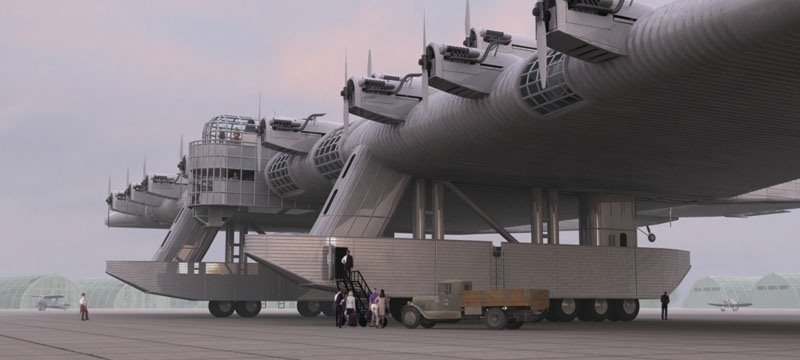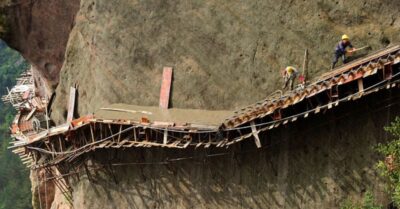
See that? That is an actual aircraft developed by the Soviets in the early 1930s. It is the Kalinin K-7, a heavy experimental aircraft with an extremely awkward design that leaves us questioning its airworthiness. It has an extremely unusual configuration with twin booms. It also has a huge housing that contains landing gears and even working machine gun turrets. Even more curious is the fact that a passenger version of this strange flying abomination also existed.

The mammoth wings of the Kalinin were an astonishing 2.3 meters in thickness. They were so wide that passenger areas were later installed in the thickness of these wings. The material used in its construction was primarily Chromium Molybdenum steel. The original design of the aircraft was not that bad as it was a bomber. But as load requirements increased, the plane had to be retrofitted with more engines, compartments, wheels and many other ugly features that made it look lesser and lesser like a plane.
Who designed this badass plane?
Well mandatory salute to the person behind this item of a plane, but it can be forgiven owing to early days of aviation i.e. the 1930s. It was designed originally by the communists’ World War 1 and Civil War pilot Konstantin Kalinin, and the plane got its name from him. Although it looks comical, in fact, its wingspan is almost equal to that of a B-52 bomber that was developed by the Americans in the 1950s. But, the absurd covered area of its wings, non-existent fuselage and sheer number of wings made it very uneasy to the eye.

But it was put to good use by the Russians. They could find a use for anything in the Soviet economy. It could house 120 passengers and drop 114 fully armed and ready paratroopers in the enemy area beside carrying 7 tonnes of mail, eight twenty millimeter cannons, eight seven millimeter machine guns and 9.6 tonnes of explosives. As compared to it, B-52 can only carry half of it. But, I don’t think the owners were dumb enough actually to use it on bombing missions. I mean seriously, that thing could be targeted by a manual artillery unit very accurately while making such runs.

The construction was started in Kharkiv in 1931, and the first flight was done in 1933. As expected, the massive frame experienced significant vibrations and unstable conditions. The engineers were at a loss to explain this as not much was known about the natural frequencies of materials and how to avoid them. There was an eventual crash of the Goliath aircraft in which 13 crew members died and one on the ground.

But, to the Red Army and nation, the aircraft was much more important than its working. It was hailed as a victory of the successful steel industry practices being imposed in the country. It was the first local aircraft to be made from the proud “national” steel produced by factories. Although the project was to be extended with two more prototypes, the engineers and designers had finally got some sense knocked into them. They abandoned the project in 1935 altogether. Good thinking or else what kind of bombers they would have used in the incoming World War? We cannot possibly imagine!











